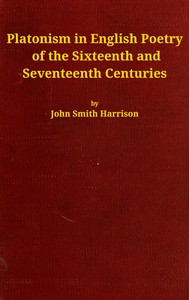| Author |
Harrison, John Smith, 1877- |
| LoC No. |
03022088
|
| Title |
Platonism in English poetry of the sixteenth and seventeenth centuries
|
| Alternate Title |
Platonism in English poetry of the 16th and 17th centuries
|
| Original Publication |
New York: The Columbia university press, 1903.
|
| Series Title |
Columbia University studies in comparative literature
|
| Note |
Reading ease score: 61.6 (8th & 9th grade). Neither easy nor difficult to read.
|
| Note |
"This essay was presented as a dissertation for the doctorate in Columbia University"--Preface.
|
| Credits |
Richard Tonsing, Aaron Adrignola, and the Online Distributed Proofreading Team at https://www.pgdp.net (This file was produced from images generously made available by The Internet Archive)
|
| Summary |
"Platonism in English Poetry of the Sixteenth and Seventeenth Centuries" by John Smith Harrison is a scholarly treatise examining the influence of Platonic philosophy on English poetry, written during the early 20th century. The work articulates how Platonism shaped the spiritual and ethical framework of poets from that period, focusing specifically on poets like Edmund Spenser. The book delves into themes of love, beauty, holiness, and the moral ideals that stem from Platonic thought, providing insights into how these ideas were integrated into the poetic landscape of the time. The opening of the text establishes its critical approach, detailing how Harrison intends to explore Platonism not through the lens of individual poets but as a collective influence on the poetry as a whole. He introduces concepts such as the duality of earthly versus heavenly beauty, discussing how these notions manifest in Spenser's work, particularly through allegorical characters symbolizing virtues like holiness and temperance. As an example, he highlights the character Una from "The Faerie Queene," depicting her as an embodiment of Platonic wisdom and truth. Furthermore, the text comments on how the poets of the time aligned their depictions of love and beauty with Platonic ideals, framing the discussion within a broader cultural and historical context. This scholarly examination serves to illuminate the intricate ways in which philosophy informed poetic expression during a pivotal era in English literature. (This is an automatically generated summary.)
|
| Language |
English |
| LoC Class |
PR: Language and Literatures: English literature
|
| Subject |
English poetry -- Early modern, 1500-1700 -- History and criticism
|
| Subject |
Thesis (Ph. D.)
|
| Subject |
Renaissance -- England
|
| Subject |
Plato -- Influence
|
| Subject |
English poetry -- Greek influences
|
| Subject |
Neoplatonism in literature
|
| Category |
Text |
| EBook-No. |
73049 |
| Release Date |
Feb 26, 2024 |
| Copyright Status |
Public domain in the USA. |
| Downloads |
142 downloads in the last 30 days. |
|
Project Gutenberg eBooks are always free!
|

